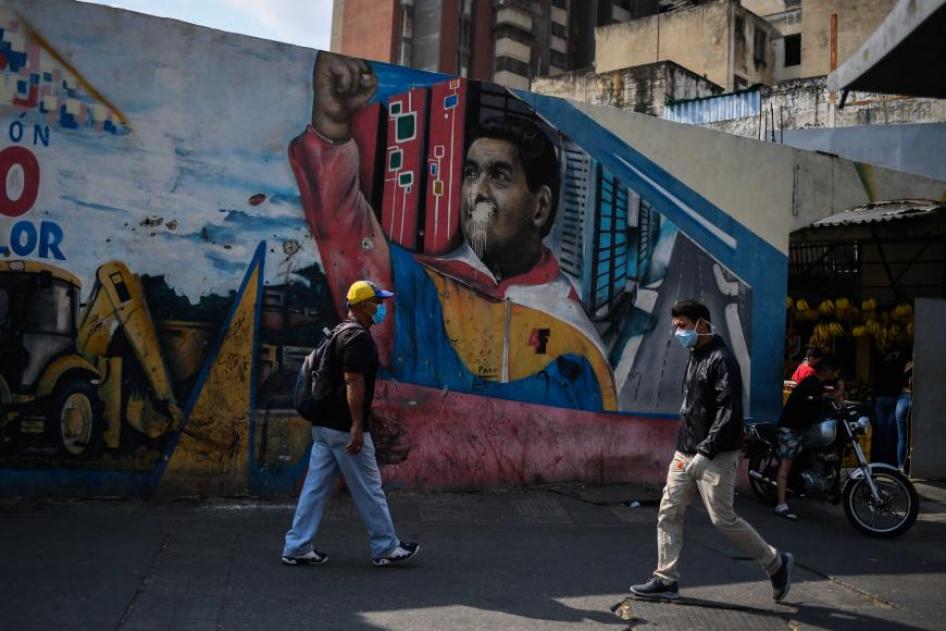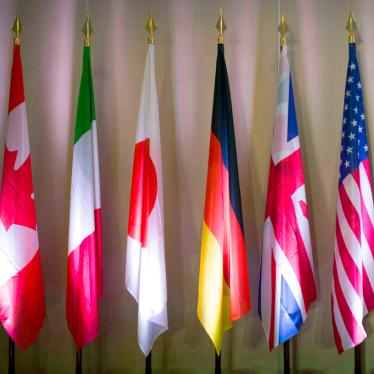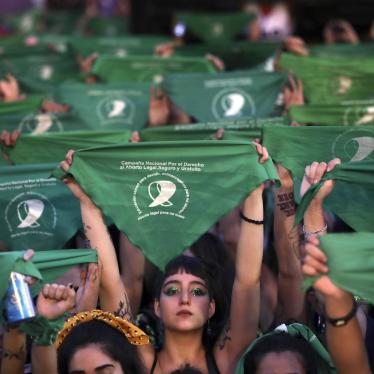(New York) – United Nations leadership and member states should press the Nicolás Maduro government to enable UN humanitarian agencies to do everything in their power to prevent a further spread of Covid-19 across Venezuela, Human Rights Watch, Johns Hopkins University’s Centers for Public Health and Human Rights and for Humanitarian Health, and Women’s Link Worldwide said today. Venezuela’s health system had collapsed even before the pandemic hit.
This was among the main messages the three organizations will bring to a special UN side event on July 29, 2020 called “Helping Venezuela Confront a Humanitarian Emergency amid the Covid-19 Pandemic.” The event takes place at 2 p.m. EDT, organized by the permanent missions of Germany and the Dominican Republic in New York. It will be webcast live here.
“The precarious Venezuelan health system, hobbled by years of infrastructure decay, shortages in medications and supplies, and severe water shortages, has no capacity to prevent the spread of Covid-19, safely care for Covid-19 patients, and protect the healthcare workforce,” said Dr. Kathleen Page, a physician and faculty member of the Johns Hopkins University School of Medicine and the Johns Hopkins University’s Centers.
On June 1, the Venezuelan health minister, Carlos Alvarado, and the opposition-led National Assembly – through its health adviser, Julio Castro – signed an agreement to coordinate efforts to obtain international funding to strengthen Venezuela’s response to the Covid-19 pandemic. This important agreement also requests “technical and administrative support” from the Pan American Health Organization (PAHO), a branch of the UN.
But the agreement needs to be carried out and monitored by independent third parties to ensure that the aid reaches the Venezuelans who need it.
Venezuela is battling an unprecedented humanitarian emergency that, together with the brutal crackdown on opponents, has compelled more than five million Venezuelans to seek refuge abroad, most to neighboring countries.
In 2019, Venezuela had the world’s steepest rise in malaria cases. Vaccine-preventable diseases such as measles and diphtheria, which had been eradicated, had already returned long before Covid-19 hit. Hospitals lack basic supplies to prevent infection and treat illness. Many do not have regular access to water and electricity, let alone medicine and respirators, or protective equipment for doctors and nurses.
The Covid-19 pandemic has further exacerbated the pre-existing crisis, which was largely the result of actions by the Nicolás Maduro government. Infectious diseases thrive under the conditions of poverty and malnutrition that many Venezuelans face.
The collapse of Venezuela’s health system, the absence of public policies to protect sexual and reproductive rights, and the lack of contraceptive methods has generated serious setbacks for Venezuelan women’s access to sexual and reproductive health, Venezuelan women rights activists say. According to the latest available official epidemiological statistics, maternal mortality rose by 65 percent and infant mortality increased by 30 percent in 2016. The health minister who published these statistics was promptly fired, and Venezuelan authorities have not published such data since.
“In the midst of the humanitarian emergency and pandemic in Venezuela, access to sexual and reproductive health services is severely restricted, posing a specific risk for thousands of women, girls, and adolescents,” said Selene Soto, senior attorney for Women’s Link Worldwide. “This is especially important for those in the most vulnerable conditions, facing a lack of contraceptives, an increase of unwanted pregnancies and unsafe abortions, and the lack of safe services for pregnant women.”
To date, 16.5 million people worldwide have been infected with the novel coronavirus, and 654,817 people have died. The disease has put a strain on the health systems of some of the most advanced democracies.
Latin America is among the regions hardest hit. Venezuelan authorities have reported 15,988 Covid-19 confirmed cases, and 146 Covid-19 related deaths. The real number is almost certainly much higher, given the limited availability of reliable testing, limited transparency, and the persecution of medical professionals and journalists who report on this issue. Overcrowding in low-income areas and prisons, as well as limited access to water in hospitals and homes, makes it likely that the new coronavirus will rapidly spread within the country.
The UN World Food Programme (WFP) and its partners have the logistical capacity to provide a significant amount of humanitarian aid nationwide. Venezuelan authorities, UN Secretary-General Antonio Guterres and UN Emergency Relief Coordinator Mark Lowcock, donor countries, and UN member states with influence should ensure that the WFP, PAHO, and their partners have all the support and access they need to save lives.
Venezuelan authorities should not interfere with the equitable distribution of aid and should enable the UN to do everything in its power to assist the Venezuelan population. That means giving aid workers full access to all hospitals and clinics nationwide, allowing them to move freely throughout the country despite quarantine restrictions, giving them priority access to gasoline, and ending reprisals against health workers who share accurate information about Covid-19 or the government’s response to the pandemic.
Venezuelan authorities should also allow independent experts to review and publish all available epidemiological data, disaggregated by gender, age, and location. They should increase transparency about the extent of the humanitarian emergency by reporting accurate counts of Covid-19 confirmed cases and deaths and by resuming regular publication of detailed mortality and morbidity reports.
“UN Secretary-General António Guterres, his humanitarian team, and UN member states should insist that the UN take complete charge of the fight against Covid-19 in Venezuela,” said Louis Charbonneau, UN director at Human Rights Watch. “The secretary-general should publicly call on Venezuelan authorities to open the doors to a full-scale, apolitical UN humanitarian response that includes allowing the WFP to fully deploy to the country’s interior. Maduro needs to stop playing the victim and let the UN experts do their work.”
Venezuela: Allow UN to Help Stop Covid-19 Spread
Member Countries, Donors Should Support Apolitical Aid Efforts
Your tax deductible gift can help stop human rights violations and save lives around the world.
Tags
Topic
Most Viewed
-
June 24, 2022
Q&A: Access to Abortion is a Human Right

-
April 27, 2021
A Threshold Crossed

-
April 17, 2024
West Bank: Israel Responsible for Rising Settler Violence

-
June 21, 2017
“Just Let Us Be”

-
September 3, 2019
“Don’t Punish Me for Who I Am”




